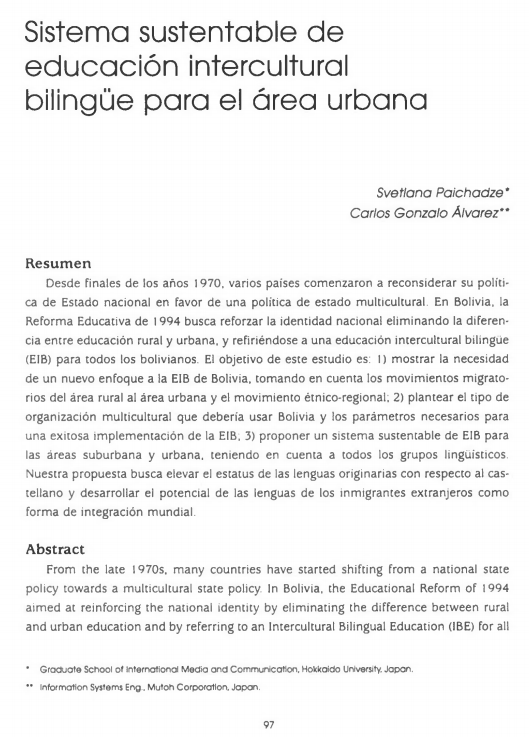Sustainable bilingual intercultural education system for the urban area
DOI:
https://doi.org/10.35319/lajed.20067240Keywords:
Multiculturality, Interculturality, Migration, IntegrationAbstract
From the late 1970s, many countries have started shifting from a national state policy towards a multicultural state policy. In Bolivia, the Educational Reform of 1994 aimed at reinforcing the national identity by eliminating the difference between rural and urban education and by referring to an Intercultural Bilingual Education (IBE) for all Bolivians. The objective of this paper is: 1) To show the need for a new approach to the IBE in Bolivia, taking into account the migratory movements from the rural to the urban areas and the ethnic-regional movements. 2) To establish the type of multicultural orga- nization that would suit Bolivia, and the parameters for a successful implementation of the IBE. 3) To propose a sustainable system of IBE for the suburban and urban areas, considering all the linguistic groups. Our proposal aims at elevating the status of the ori- ginal languages with respect to Spanish and to develop the potential of the languages of foreign immigrants as a form of global integration.
Downloads
References
Andersen, L.E. 2002. “ Migración rural-urbana en Bolivia: ventajas y desventajas" Documento de Trabajo No. 12/02, Octubre 2002, P. 14, disponible en Internet: http://www.iisec.ucb.edu.bo (último acceso: 2005/12/07)
Benson, C. 2004. “Bilingual Schooling in Mozambique and Bolivia: From experimentation to implementation", Language Policy. March 2004, Vol. 3, No. 1 pp 47-66.
Brubaker, R. 1992. Citizenship and Nationhood in France and Germany. London: Harvard University Press.
Colonia Okinawa (1995) “うるまからの出発:コロニア・オキナワ入植四十周年記念誌, サンタクルス:コロニア・オキナワ入植40周年記念誌編纂委員会” Hiroaki Yamashiro (version espanol), Susumi Aniya (Version Japones), 1995.
Contreras, M. E. y Simón M. L. Talavera. 2003. "The Bolivian Education Reform 1992- 2002. Case Studies in Large-Scale Education Reform”. Vol. II, No. 2 World Bank. Disponible en internet: http://www-wds.worldbank.org (último acceso: 2005/12/07)
Gadelii, K.E. 1999. “ Language planning: Theory and Practice. Evaluation of language planning cases worldwide". For the Language Division Education Sector. UNESCO 1999, Disponible en Internet: http://unesdoc.unesco.org/images/0011/001184/118456eo.pdf (último acceso: 2005/12/31).
Gibson, M.A. y J.U. Ogbu. 1991. Minority status and Schooling. A Comparative Study of Immigrant and Involuntary Minorities. NY London: Garland Publishing Inc.
Hornberger, N.H. 2002. “ Multilingual language policies and the continua of biliteracy: An ecological approach". Language Policy, vol. 1, no. 1, pp. 27-51, March.
Juárez, J.M. y Sonia Comboni S. 1997. “Sistemas educativos nacionales: Bolivia, breve reseña histórica del sistema educativo". Organización de Estados Iberoamericanos (OEI), La Paz, Bolivia. Disponible en internet: http://www.oei.org.co/quipu/bolivia/boli02.pdf (ultimo acceso: 2005/12/07)
La Patria. 2004. "Setecientos delegados de todos los sectores definirán el futuro de la educación en Bolivia". Oruro, Bolivia. Jueves 29 de julio de 2004.
López, L. E. y W. Küper 1999. "La educación intercultural bilingüe en América Latina: balance y perspectivas". Revista Iberoamericana, No. 20, mayo-agosto 1999. pp. 17-85
Luykx. A. 1999. "The Citizen Factory (Schooling and Cultural Production in Bolivia)". State University of New York.
Maidana. I. 2003. "La Reforma Educativa en blanco y negro". La Razón, La Paz, Bolivia. Jueves, 26 de marzo de 2003.
May. S. 2003. "Misconceiving Minority Language Rights: Implications for Liberal Political Theory". In Language Rights and Political Theory. New York: Oxford University Press, pp. 123-152.
Patten. A. 2003. "What kind of Bilingualism?". In Language Rights and Political Theory. New York: Oxford University Press, pp. 296-321.
Quispe, E. 2004. "Los padres de la familia quieren logros y no palabras". Programa de Formación en Educación Intercultural Bilingüe para los Países Andinos, PROEIB Andes. Publicaciones Suplemento EIB. Año 2, Nro. 03, Febrero 2004. Disponible en Internet: http://www.proeibandes.org/publicaciones/suplemento/3/analisis.html último acceso: 2005/12/07)
Rep. de Bolivia (CEB 1956). "Código de la Educación Boliviana". Ministerio de Educación y Bellas Artes. Empresa Industrial Gráfica E. Burillo y Cia. , 20 de julio de 1956.
Rep. de Bolivia (CONED 2004). "Evaluación del Programa de Reforma Educativa (La Paz), Bloques: Evaluación del Programa de Reforma Educativa" Ministerio de Educación, Consejo Nacional de Educación (CONED). Noviembre 2004. Disponible en Internet: http://coned.minedu.gov.bo/actvs/evaprejpz/docs/bloques/doc02.ppt (último acceso: 2005/12/31)
Rep. de Bolivia (CPRB 1994). "Constitución Política de la República de Bolivia". Disponible en Internet: http://www.georgetown.edu/pdba/Constitutions/Bolivia/consboliv2005.html (último acceso: 2005/12/31)
Rep. de Bolivia (INE 2000). "Estadísticas Nacionales 2000, Cuadro 2, Bolivia: Indicadores de Educación Pública, 1992-1999. " Instituto Nacional de Estadística (INE). Disponible en Internet: http://www.ine.gov.bo/pdf/Bo_Es_NaZBEN_2000_00.pdf (último acceso: 2005/12/07)
Rep. de Bolivia (INE 2001a). "Bolivia: mapa de pobreza 2001”. Instituto Nacional de Estadística (INE).
Rep. de Bolivia (INE 2001b). "Censo 2001 ". Instituto Nacional de Estadística (INE), 2001.
Rep. de Bolivia (INE 2003). "Estadísticas Nacionales 2003, Gráfico 7 Bolivia: Distribución de la población por área geográfica, censos de 1950, 1976, 1992 y 2001". Instituto Nacional de Estadística (INE). Disponible en Internet: http://www.me.gov.bo/pdf/Bo_Es_Na/BEN_2003_03.pdf (último acceso: 2005/12/07)
Rep. de Bolivia (LRE 1994). "Ley de Reforma Educativa". Ley No. 1565 de 7 de julio de 1994.
Taylor, S.G. 2004. "Intercultural and Bilingual Education in Bolivia: the Challenge of Ethnic Diversity and National Identity". Documento de trabajo No. 01/04, Febrero 2004. Disponible en línea: http://w w w .iisec.ucb.edu.bo
UNESCO. 2000. "World Culture Report 2000". Disponible en Internet:http://www.unesco.org/culture/worldreport/ (ultimo acceso: 2005/12/31)






